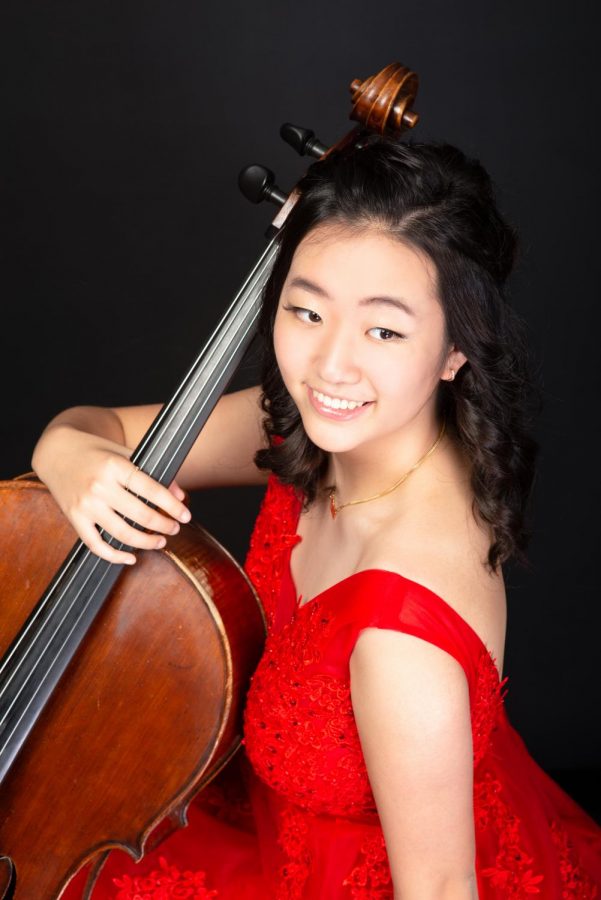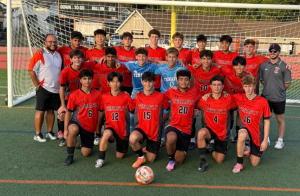Profile of Christy Choi: On Her Path to Becoming a Professional Cellist
February 26, 2021
Not many people know what they want to do in life, and even fewer teenagers know for sure. While most high school students are still conflicted about what they want to pursue in their careers, senior Christy Choi is devoted to her life companion: the cello. As she juggles school work in addition—sometimes deciding not to take harder courses she wants because she needs to practice—Choi ensures that her cello is with her every step of the way.
Enraptured at six years old by a video of Yo-Yo Ma and Kathryn Stott playing Saint-Saens’s “The Swan,” Choi started the cello when her mother prompted her to pick up an instrument. From that moment, she knew that she wanted to play the cello for the rest of her life, in some shape or form. Although she had fun growing up, she was already devoting a huge amount of time to practicing and performing even in elementary school, making her accustomed to balancing her time. She was able to gain experience even at a young age in Brazil by playing with those older than her, such as people in post-college, orchestras or ensembles. Debuting with an orchestra at nine with the “Cello Concerto No. 1” by Joseph Haydn, since then she toured around the country as either a soloist or with different orchestras and cello ensembles. Yet, she was hindered by the fragility of music education there, a result of various socioeconomic factors.
When she moved to Tenafly, her world was turned upside down. While Choi was one of the few child cellists in Brazil, or at least Sao Paulo, she was met with countless talented cellists her age in this different environment. Accepted to the Juilliard Pre-College in 9th grade, it was difficult for her to survive and keep up with her peers. Yet, this was also the time when her eyes were opened to a reality apart from her bubble in Brazil, allowing her to become more competitive and independent. As she realized that with a higher chair in the section comes a higher status, she worked hard to rapidly progress from sitting almost last chair in her first year to sitting principal in her third. With status also came opportunities, as she could give a solo recital at the Lincoln Center’s Paul Recital Hall, as well as play with conductors like Sir Simon Rattle, Yannick Nézer-Séguin, and David Robertson. She cites her time in the pre-college as one of the best things that has ever happened to her, as she realized that there are so many cellists that can play decently. However, she needed to be amazing to succeed. Choi said, “In Brazil, I was much more laid-back, thinking that I was enough for what I was because of the different offers I received. If I stayed in Brazil, I’d be more well-known by the community. But I know for a fact that I wouldn’t have developed as much as I could have, and definitely not as much as I did here, with inspiring peers, faculty, and teachers who push me in a different way.”
As a gifted young musician, Choi has an endless list of accomplishments with her cello, aside from her admittance to Juilliard Pre-College. In Brazil, she did a commercial shoot with Globo, the biggest T channel in Brazil, as its musician representative, and was the youngest musician representative in the Escola Municipal de Music documentary filmed at Teatro Municipal. Additionally, at the 2013 Concurso Internacional Paulo Bosisio, she placed 1st as the youngest competitor and prize winner in the history of the competition. She was also invited as principal cellist to the European orchestra in the Association of International Schools in Amsterdam, Holland, and received Honorable Mention from YoungArts. During the summer, she received intensive music training over seven weeks in the renowned Perlman music program as one of the 30 students, and three cellists, who were admitted. Recently, she also received the National Public Radio’s (NPR) Jack Kent Cooke Young Artist Award Scholarship, and made an appearance on NPR’s “From the Top” radio show.
Choi attributed her love for the cello to its similarity to the human voice. “I love the cello because the cello is the closest sound that an instrument can make to a human voice,” she said. “Although it’s harder to say everything in words, playing the cello is my voice, and I can always express all that I want to say. There exist so many different ways to express thoughts and feelings, none of which are right or wrong since music is so abstract and personal. While someone thinks something may be beautiful, others may not, which is the same with composers because I love romantic and modern composers like Tchaikovsky or Shostakovich but others like Bach or Mozart.”
Her most memorable moment while playing the cello was her performances in the Sala São Paulo with the Orquestra Sinfônica da Universidade de São Paulo (OSUSP), comprised of all professional musicians. She played the “Cello Concerto” by Edward Elgar alone eight times, and while some of them were formal night concerts, she was more compelled by the ones for children in underprivileged schools all over the country. “Since the music education in Brazil is so poor, especially in poor towns, some of these kids had never seen a cello before or encountered classical music,” Choi said. It was extremely rewarding for me to be able to introduce music to these kids who live in extreme poverty.”
Choi’s musical and life ambition stems from this. “Just as Yo-Yo Ma left an impact on me when I first started the cello, and still now because the way he plays fits with me personally, I want to be a cellist that leaves an impact on people,” she said. “I truly believe that the more I delve into music, the more I will understand both the concrete and abstract to help me deliver that meaning to my audience.” She regards performing and teaching as the most effective ways to do so, which is why beyond college, Choi wants to perform in chamber or duos, and eventually teach at a conservatory. She believes that one of the strongest sparks of inspiration can be created in the relationship between teacher and student, and thus the teacher is one of the most influential people in a musician’s life. He or she is one of the people who can love the cello so much that the student notices and loves the instrument as well, and that love can be conveyed through teaching and through performing as well.” With no doubt, Choi is already a cellist who loves her art, and she will continue to impact others through her playing.

















































































































































